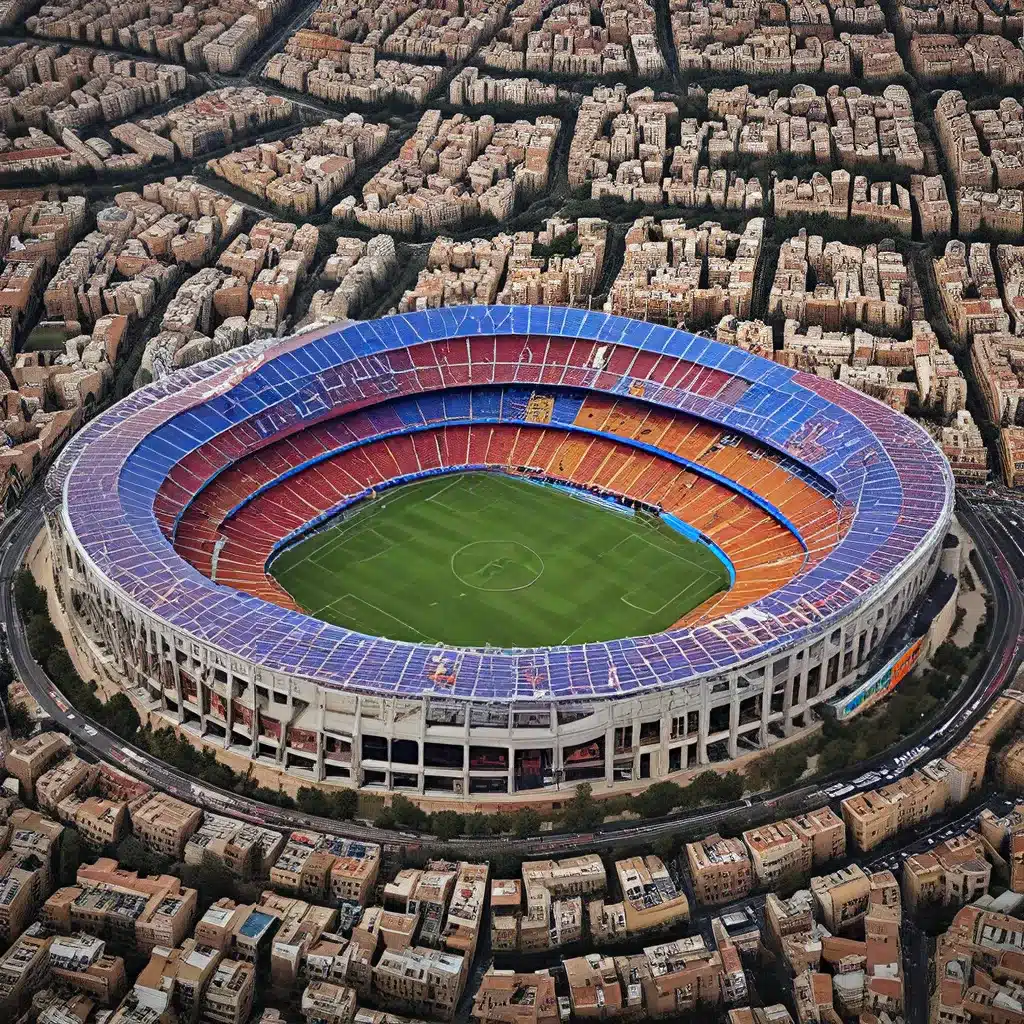
The Iconic Home of FC Barcelona
Camp Nou, the home stadium of the renowned football club FC Barcelona, is a true icon of the sport. Often referred to as the ‘Cathedral of Catalan Football,’ this massive arena is not just a mere sporting venue, but a symbol of the region’s rich cultural heritage and the passionate allegiance of its devoted fans.
A Storied History of More Than a Club
Opened in 1957, Camp Nou has witnessed the rise and dominance of FC Barcelona, one of the world’s most successful and beloved football clubs. The stadium’s name, which translates to ‘New Field’ in English, reflects the club’s ambition to construct a larger and more modern home to accommodate its growing fanbase.
Over the decades, Camp Nou has become more than just a stadium – it is a bastion of Catalan culture and a symbol of the region’s fight for independence. During the oppressive rule of Francisco Franco, the stadium was one of the few places where traditional Catalan songs and protests for independence could be openly expressed, as the dictator feared that cracking down on these demonstrations would attract unwanted international attention.
Even today, Camp Nou remains an integral part of the Catalan identity, with the club’s anthem, the Cant del Barça, being sung in Catalan rather than Spanish. The stadium’s association with the Catalan national football team, which is not officially recognized by FIFA, further solidifies its role as a bastion of regional pride and identity.
The Cathedral of Football
With a staggering capacity of 99,354 seats, Camp Nou is the largest stadium in Europe and the fourth-largest football stadium in the world. Its sheer size and imposing presence have earned it the fitting nickname, the “Cathedral of Football.”
The stadium’s architecture is a testament to its grandeur, with its iconic façade featuring a striking blend of Modernist and Noucentista styles. The towering four-storied structure, with its arched entrances and sweeping roofline, evokes a sense of reverence and awe in all who set foot within its walls.
Game Day Experience: A Passionate Affair
Attending a match at Camp Nou is a truly immersive and unforgettable experience. As fans make their way to the stadium, the air is thick with the palpable anticipation and excitement of the impending match. The streets surrounding the arena are alive with the vibrant colors of Barcelona scarves and jerseys, as well as the enticing aromas of traditional Catalan jamon y pan con tomate (cured ham on toasted bread with tomato).
Upon entering the stadium, visitors are immediately struck by the electric atmosphere that permeates every corner of the Cathedral. As the players take the field, the crowd erupts in a thunderous roar, with the entire stadium rising to sing the Cant del Barça in unison. The passionate supporters, many of whom have been attending matches at Camp Nou for decades, often speak of the players as if they were family members, rather than mere entertainers.
The fluidity and teamwork-oriented style of play displayed by FC Barcelona on the pitch is a testament to the club’s ethos of being “more than a club.” The seamless passing exchanges between the players, often likened to a well-choreographed dance, captivate the audience, who eagerly await the next moment of brilliance from the likes of Lionel Messi and other club legends.
The Unwavering Loyalty of Culés
The devotion of FC Barcelona fans, known as culés, is unparalleled. Despite the stadium’s advanced age and occasional structural issues, the club’s members have consistently voted against the construction of a new stadium, preferring to preserve the hallowed grounds of Camp Nou as their spiritual home.
This unwavering loyalty is a reflection of the deep-rooted connection between the club, its fans, and the city of Barcelona. For many culés, attending a match at Camp Nou is not just a sporting event, but a cultural and emotional pilgrimage – a chance to be part of the rich history and traditions that have defined the club and its devoted supporters for generations.
The Future of the Cathedral
As FC Barcelona continues to evolve and adapt to the changing landscape of modern football, the future of Camp Nou remains a topic of intense discussion and debate. While the club has explored the idea of renovating or even replacing the iconic stadium, the overwhelming sentiment among its members is to preserve the beloved “Cathedral” and maintain its status as a sacred ground for the club and its supporters.
Regardless of the eventual outcome, one thing remains certain: Camp Nou will continue to hold a special place in the hearts of culés and football enthusiasts alike. As a testament to the enduring power of passion, tradition, and community, this iconic stadium stands as a shining example of the profound impact that a football club and its home can have on the lives of those who hold it dear.
Exploring the Stadium Journey
For those seeking to immerse themselves in the rich history and captivating atmosphere of Camp Nou, the stadium journey offers a unique and unforgettable experience. From guided tours that delve into the stadium’s architectural marvels and cultural significance, to the thrill of witnessing a live match in the heart of the Catalan capital, Camp Nou is a must-visit destination for any true football enthusiast.

